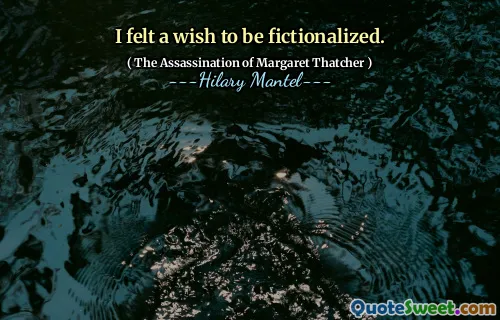in case the dead ones rolled in late.
In Hilary Mantel's "The Assassination of Margaret Thatcher," a poignant narrative unfolds with its central theme revolving around the intricacies of life and death in a politically charged atmosphere. The story delves into the consequences of actions and decisions that ripple through time, particularly in the context of a politically significant figure like Margaret Thatcher. Mantel's reflection on mortality raises questions about fate and the repercussions of historical events on personal lives. The phrase "in case the dead ones rolled in late" highlights the unpredictable nature of life and death, suggesting that the past continues to influence the present. This evokes a sense of anxiety about unresolved issues and the inevitability of confronting history. Through her evocative prose, Mantel invites readers to reflect on the interplay between individual experiences and broader sociopolitical narratives, ultimately challenging their perceptions of legacy and consequence.
In Hilary Mantel's "The Assassination of Margaret Thatcher," a poignant narrative unfolds with its central theme revolving around the intricacies of life and death in a politically charged atmosphere. The story delves into the consequences of actions and decisions that ripple through time, particularly in the context of a politically significant figure like Margaret Thatcher. Mantel's reflection on mortality raises questions about fate and the repercussions of historical events on personal lives.
The phrase "in case the dead ones rolled in late" highlights the unpredictable nature of life and death, suggesting that the past continues to influence the present. This evokes a sense of anxiety about unresolved issues and the inevitability of confronting history. Through her evocative prose, Mantel invites readers to reflect on the interplay between individual experiences and broader sociopolitical narratives, ultimately challenging their perceptions of legacy and consequence.






